Before I come to the Tudors and Stuarts 25 History Weekend, as well as a visit from sixth-form students studying English Literature at Cherwell School in Oxford, I want to flag up two forthcoming events this month. Firstly, we have the FREE study day and web launch of the Kent Maritime Communities project (CKHH at CCCU and the University of Southampton) on Saturday 10 May. The study day is entitled ‘Kent and Europe, 1450–1640: Merchants, Mariners, Shipping and Defence’ (this is also the title of the project team’s new book) and will take place at the Community Cinema in Dover Museum. For the programme and booking, please see: https://ckhh.org.uk/events/details/kent-and-europe-1450-1640-merchants-mariners-shipping-and-defence and the same weekend will be the re-opening of the Dover Maison Dieu – a fantastic combination!
The other event is the 2025 Annual Becket Lecture on Tuesday 27 May at 7pm (wine reception from 6.30pm) in the Michael Berry Lecture Theatre, Old Sessions House, CCCU, Canterbury by Professor Rachel Koopmans. Her lecture is entitled ‘Murder, Miracles, Liturgy, and Stained Glass: Thomas Becket and Benedict of Peterborough’ and the Becket Lecture will be a book launch, provided by Craig Dadds at the CCCU Bookshop, for Rachel’s new edition of Benedict of Peterborough’s St Thomas miracle collection. Her book is entitled The Passion and Miracles of St Thomas Becket by Benedict of Peterborough, published by Boydell Press in May 2025. This is the first English translation of Benedict’s remarkable (and very readable) works. The lecture is FREE and for more details see: https://ckhh.org.uk/events/details/annual-becket-lecture-2025
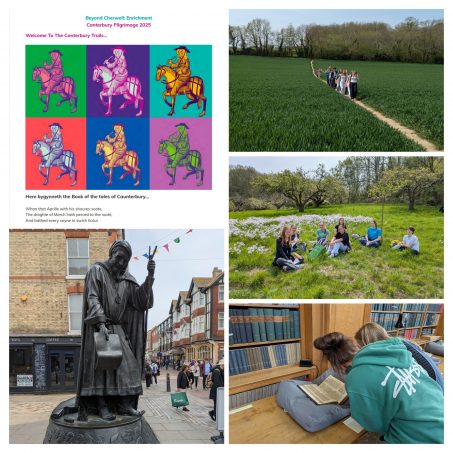
Now to Cherwell School’s visit to Canterbury last Friday, who were again led by Charlotte Richer, Head of Sixth Form and English Teacher. Charlotte and her colleague last brought a group studying ‘A’ level English Literature in 2022 (Charlotte had found out about CCCU through the CKHH blog) and because they had had such a great experience, she was keen to repeat it with her sixth formers this year. Consequently, having arrived in Canterbury and come on to CCCU, I was delighted to give them a workshop on Chaucer’s Canterbury and medieval pilgrimage, being helped by Noah, a MEMS MA student. Having given them a mini lecture, we spent the bulk of the workshop exploring the primary sources pack I had made for them. This included visual and material culture in the form of images from the Becket Miracle Window that Rachel Koopmans is currently investigating, known locally as the ‘Kent Window’, and photos of a wide range of pilgrim badges linked to Becket. The rest were written sources, such as the will of a late medieval Canterbury badge maker and that of a chaplain at St Thomas the Martyr’s hospital in Canterbury High Street, as well as an extract from the ‘continuation’ of Chaucer’s Canterbury Tales and another from the customary of St Thomas’ shrine from the same period. In groups, the students took some time to investigate ‘their’ source to decide what it revealed about pilgrimage and Chaucer in Canterbury within the context of late medieval society, thereby providing ideas for their upcoming ‘A’ level exam on the Canterbury Tales in context. The general discussion towards the end of the session sparked a wide range of ideas, comments and questions on the sources and how collectively they can be used to produce at least a partial jigsaw picture on pilgrimage in Chaucer’s time that he seemingly drew on for his Canterbury Tales.
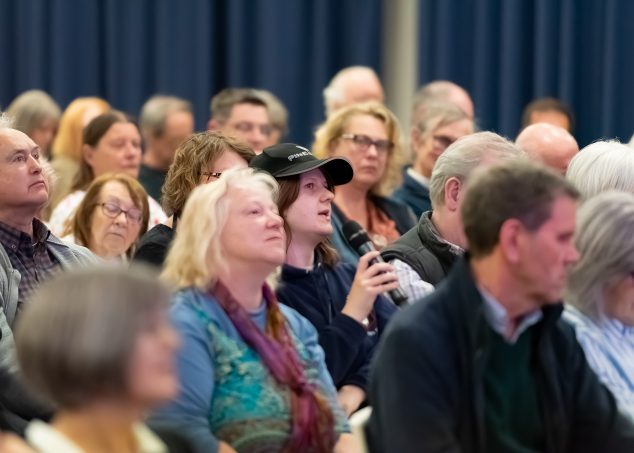
After the workshop, two CCCU student ambassadors guided the sixth formers on a tour of the campus before those from Cherwell headed off to Canterbury Cathedral for lunch, a guided tour of the cathedral archives and another of the cathedral. Indeed, the students were excited to see which window and where within it the miracle narratives they had looked at in the morning were situated. Moreover, their visit to the cathedral also included Evensong.
The following morning, they travelled a relatively short distance outside Canterbury and then walked along the way pilgrims may have travelled to get an idea about what it would have been like to be a pilgrim. This they enjoyed, just as they had enjoyed the Chaucer pilgrimage workshop and the visit to the cathedral.
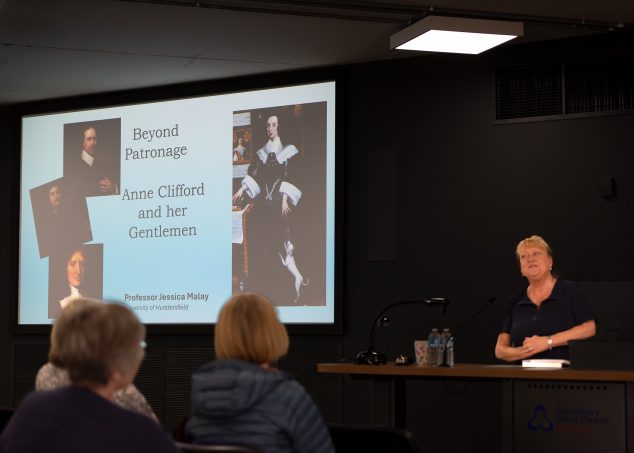
I want to spend the remainder of the blog reporting on the Tudors and Stuarts History Weekend, and on this occasion rather than talking about content, I’m going to focus on process. However, I will start by saying that it was another great occasion (yet again over a 1000 tickets sold) and therefore it is even sadder that this is its last year. It was also a shame that the Kent Archives Service were unable to have a stall at the Weekend, which they have had in the past.
More on this being the last History Weekend at its current venue in a minute, but first I want to thank the many people who were involved in ensuring its success. Our speakers were excellent, engaging audiences as they brought their expertise over a broad range of early modern topics – from the court of Henry VII to 17th-century witches. Although it is worth noting that the witches had the last laugh because that was the only session where we had problems with the AV system – the screen went blank twice, but we got over it and the presentation was very well received.
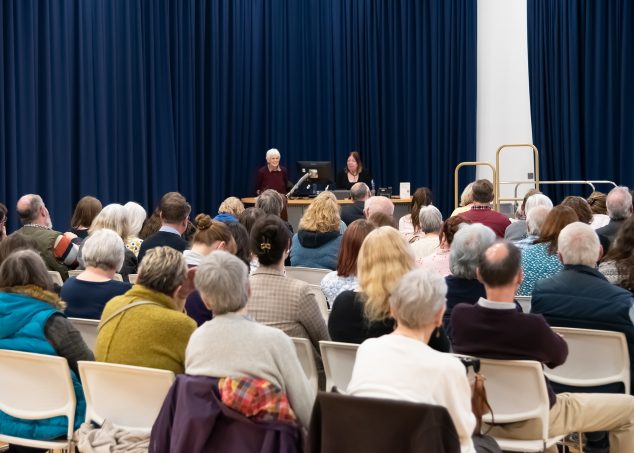
Furthermore, and in thinking about process, in the sessions I chaired the audiences were given a masterclass in terms of the crafting of a lecture. For example, Alison Weir’s talk on Queen Mary I used her biography of the queen as the way in before drawing on her own experience as a child of a broken and, as she said, messy marriage break up, the scars that it left and the implications for in Mary’s case her life as queen. This, as she said, has led her to re-evaluate Mary’s queenship, thereby demonstrating how historians continue to interrogate the evidence and are prepared to change their minds when they see this as appropriate.
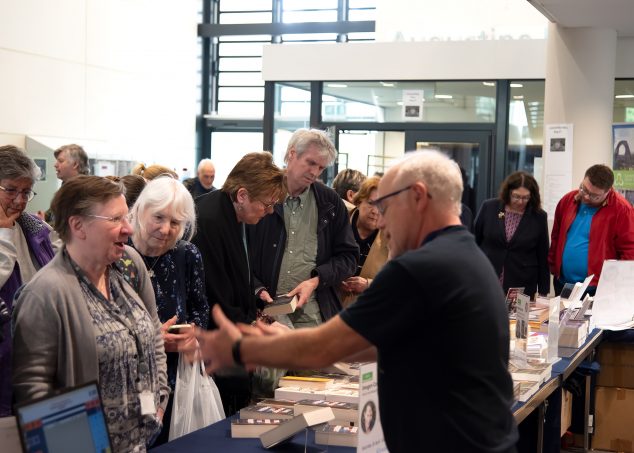
A hallmark of these Weekends has been the visits, which in terms of Tudors and Stuarts means Cressida Williams’ guided tours of the cathedral archives and library, and Paul Bennett’s exploration of early Tudor Canterbury using the Buttermarket area. Both are brilliant, but having worked with Paul in the past his tours on this small central area of the city are crafted around the idea of helping his audience to use their eyes to see differences in the buildings and to therefore think about continuity and change, about usage, and what this can tell us about the society in which they were constructed.
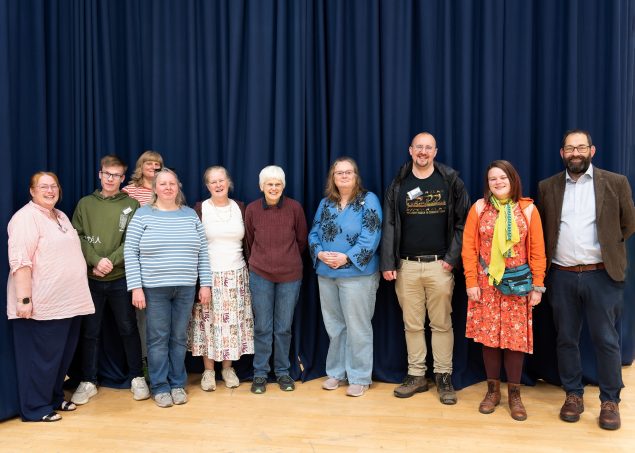
As always, my Welcome Team of volunteers were brilliant and this year in addition to having home students from 1st year undergraduates to doctoral students, I had Asian and American international students, as well as alumni from Christ Church. In total I had 20 volunteers: Diane Heath and Pip Gregory, and Jo, Noah, Abi, Aillie, Lauen, Eleanor, Christine, Peter, Jane, Jack, Kaye, Jason, Kieron, Lizzie, Marek, Dinesh, Cai, and Leo at various times over the two and a half days, with a further 5 who had wanted to help but who in the end couldn’t because of other commitments. This mix of old-hands and first-timers works extremely well and gives me a chance to provide a range of opportunities for volunteers to gain experience in such areas as customer service, event management, and publicity, thereby expanding their employability skills and enhancing their CVs.
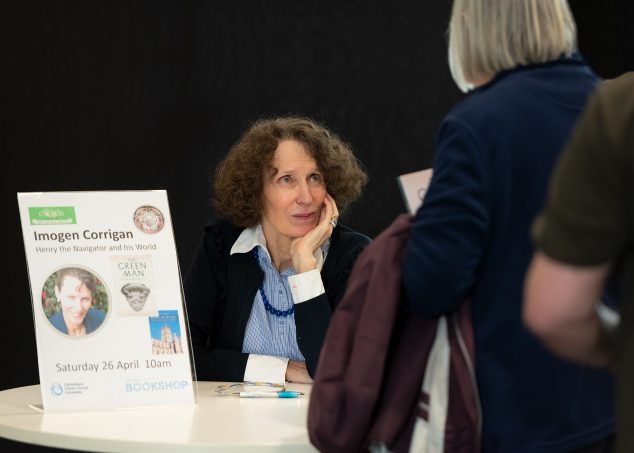
Additionally, Peter, one of the doctoral students is a professional photographer, and he took a great series of photographs covering the Weekend. As well as using some of them in this week’s blog, they will form the core of the Weekend’s legacy on the CKHH website, a testimony to the collective efforts of many people who freely give of their time to make these History Weekends a brilliant success story.
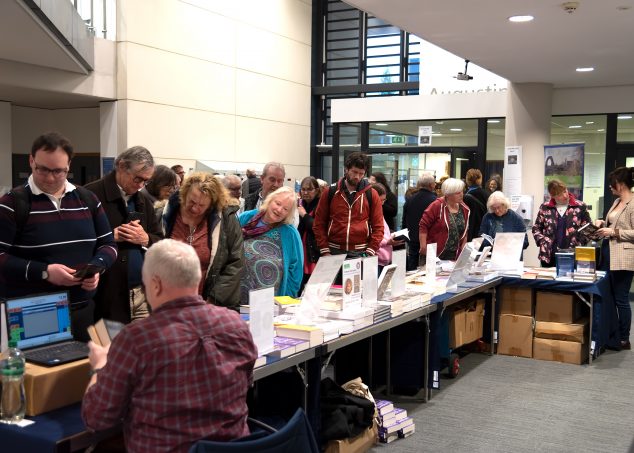
Having the CCCU Bookshop is a fantastic bonus, this year staffed by Andrew on the Friday and Craig throughout the Saturday and Sunday. As you can see, there was a great display and book signings by speakers and these facilities attracted crowds of people during coffee and lunch breaks who were keen to purchase books. This means the Bookshop’s sales for Tudors and Stuarts 2025 was second only to last year’s Medieval Canterbury Weekend, a testimony to the quality of the speakers and their books, and the tremendous amount of work undertaken by the Bookshop – thanks very much Craig!
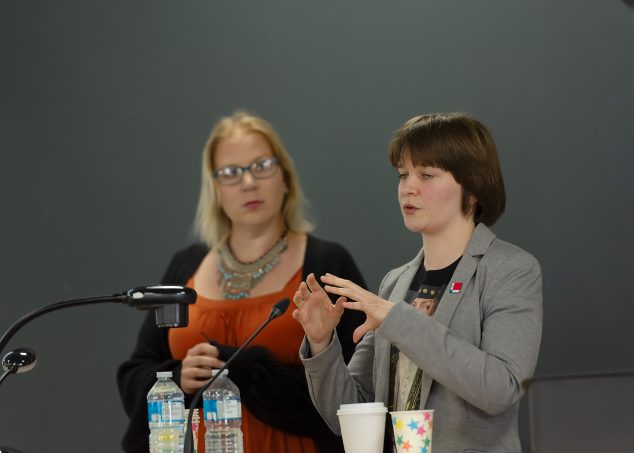
I am also very grateful to colleagues within Humanities for chairing various sessions because finding sufficient people is often a challenge. Therefore, I would like to express my thanks to David Budgen, Catriona Cooper, Astrid Stilma, David Hitchcock and Katy Mortimer. You did an excellent job of chairing speakers and keeping everything to time, quite a feat over such a range of events during a long weekend. Furthermore, their work as facilitators on behalf of the speakers is another important ingredient in the Weekend’s success.
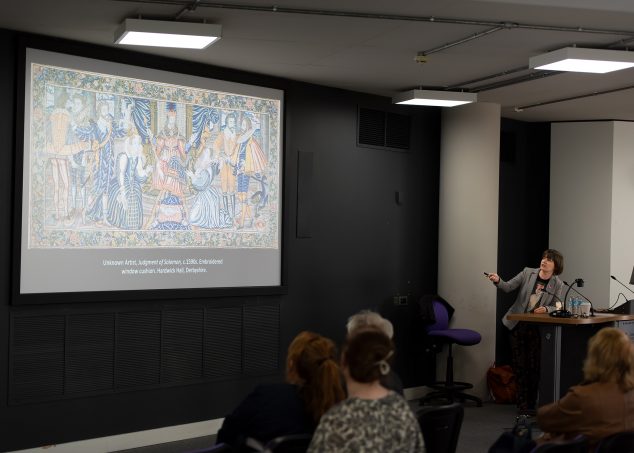
The History Weekend coincided with an CCCU ‘Offer Holder Day’, although I don’t think any of the prospective students and their parents took advantage of the offer to attend any of the lectures. Nevertheless, this did mean that Louise Mallon’s Hospitality Team were running catering outlets on the main campus and in Augustine House for Tudors and Stuarts’ audiences. At Augustine House, even though they were extremely efficient, the two members of the team were especially busy on Saturday as they served the several hundred delegates at lunchtime and during the coffee breaks. Sunday was not as busy, but again the two staff members still had a steady stream of customers who took advantage of the range of food available, in addition to the hot and cold drinks. Again, very many thanks to Louise and her colleagues, it makes such a big difference to have a friendly, efficient catering service, where people are prepared to do that bit extra, such as warming the milk for Joanne Paul’s baby when there was a lull because two lectures were in progress.
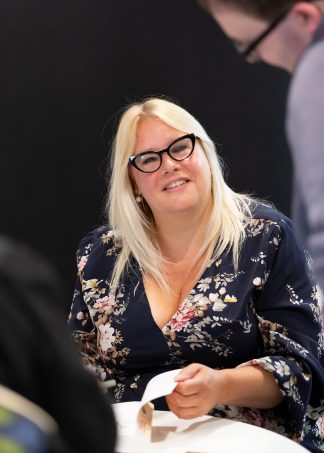
Various other people within the university were helpful before and after the Weekend, but I do want to thank Seun Adesanya and his colleagues from the AV Team who once again checked the equipment in the lecture rooms and talked through various matters with the teams of volunteers who ran the two venues. Moreover, I will be calling on the AV Team again for the Becket Lecture – thanks everyone.
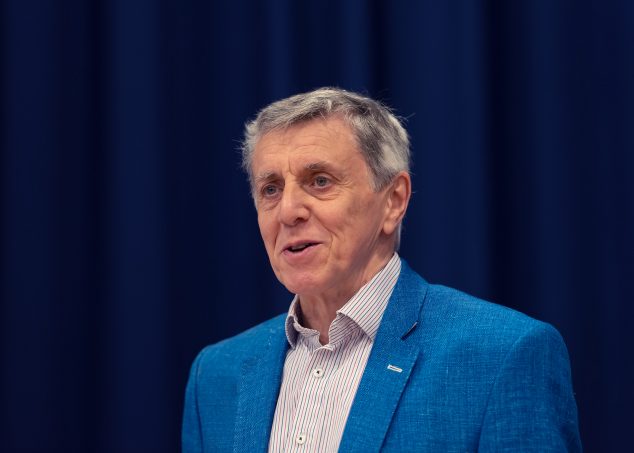
Thanks, too, should be given to our audiences who are an integral part of the process, not least because we have now built up a considerable following of people who have been coming annually, some since the first Medieval Canterbury Weekend in 2016. It is great to see this appreciation of our brilliant speakers – as articulated through the breadth and depth of the questions posed to lecturers, our audiences’ obvious enthusiasm, and the willingness of people to provide feedback in our questionnaire. In terms of process, this also involves Kellie in the box office and Ben our web designer, for both are key in the translation of the devised programme into a place where people can see what is on offer and book accordingly. Such behind the scenes activity is vital and another ingredient in the Weekend’s success.
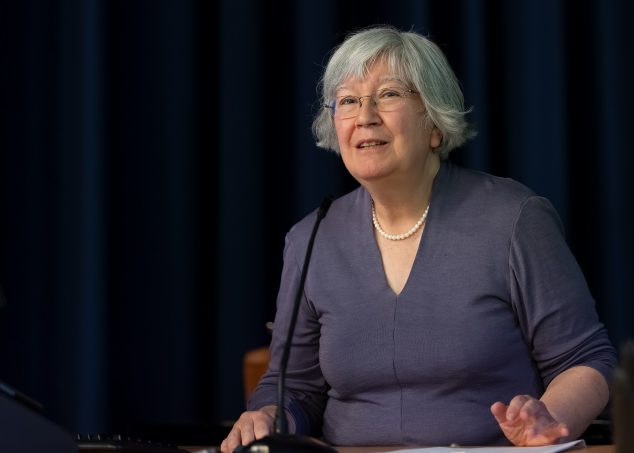
To wrap up another History Weekend, it seems only fair to give over this paragraph to comments taken from the audience feedback forms. In response to ‘what did you like about the Weekend?’ we have “Always organised brilliantly and speakers the best possible”, another person appreciated “the accessibility and inclusivity. I like the informality or although very academic approach, great to be among scholars – all the new research conveyed by the speakers”, while another wrote “Excellent speakers, very helpful and dedicated volunteers, great hospitality, great organisation”. Thinking about Knowledge Exchange there is in response to ‘What did you learn about the period?’ comments like “An immense amount, explored through a whole range of approaches which complemented each other perfectly”, while another wrote “Personal biographies of key agents in this historical period. A period which has so many layers and raises issues still relevant to our social/cultural histories today”. Among people’s favourite things were votes for many of the speakers, but the CCCU Bookshop was not forgotten and was on the list! Finally, in response to ‘What would you change?, comments include “I really enjoy this weekend and would be really disappointed if it was to end – I feel it is part of our cultural heritage and therefore very important”, another wrote “Please keep the conference going! We have only just discovered it”, another wrote “Please, please, please do not stop doing these amazing talks. Thank you Sheila for your tremendous hard work”, and this rather sums it up “We are not local, but make a weekend of it as do many others with an interest in history – not as students but just as a hobby.” But who knows the future, as a phoenix it may yet arise from the ashes somewhere in Canterbury.
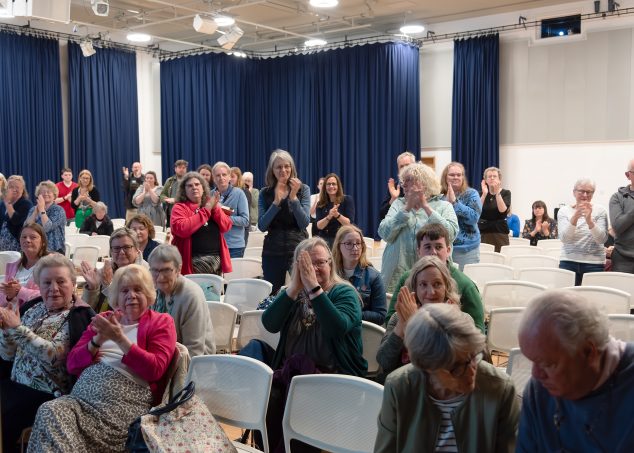
 Centre for Kent History and Heritage
Centre for Kent History and Heritage Sheila Sweetinburgh
Sheila Sweetinburgh 2649
2649


Sheila
You have done a brilliant job organising these history weekends, So sorry to hear about the staff redundancies and the end (for now at least) of this great enterprise. Best wishes for the future to you and everyone else at CCU who has supported these weekends or is affected by the cuts
Thanks very much Ian, the support from the wider history community has been great.
What a terrible loss to the university, to current and future students and historians and to anyone interested in medieval and early modern history really. I am very sorry it has come to this. You will be sorely missed, Sheila. Thank you so much for everything that you have done to enable us all to learn more about the rich history of Kent.
Thanks very much, that’s very kind of you.
Having only found out about it recently I really enjoyed attending this years Tudors and Stuarts History Weekend and hope that it can continue in some form. I did wonder why it was the same weekend as two other history events British Library and Gloucester so the organisers did well to get a good programme the speakers were great.
Thanks Robert, glad you enjoyed it and I have been using that weekend for a few years, although Easter being so late this year didn’t help.